HeadlinesSeptember 20, 2006
Bush, Ahmadinejad Trade Criticism in General Assembly Speeches
Speaking from the same lectern within hours of each other, President Bush and Iranian President Mahmoud Ahmadinejad traded criticism Tuesday at the opening session of the UN General Assembly. Taking the podium first, President Bush threatened consequences if Iran does not return to international talks on its nuclear program. Iran has said it’s open to the talks but won’t accept the administration’s pre-condition for a freeze on nuclear activities. In an appeal to Iranian citizens, Bush said Iran’s leaders were misrepresenting US intentions and using state funds to sponsor terrorism and build nuclear weapons. The President also defended his so-called “freedom agenda” in the Middle East.
- President Bush: “Today, I’d like to speak directly to the people across the broader Middle East: My country desires peace. Extremists in your midst spread propaganda claiming that the West is engaged in a war against Islam. This propaganda is false, and its purpose is to confuse you and justify acts of terror. We respect Islam, but we will protect our people from those who pervert Islam to sow death and destruction. Our goal is to help you build a more tolerant and hopeful society that honours people of all faiths and promote the peace.”
Hours later, Iranian President Mahmoud Ahmadinejad defended his country’s nuclear program which he said was for peaceful purposes. Ahmadinejad accused the US and Britain of using the UN Security Council to advance their own agendas and said the occupation of Iraq is fueling instability.
- Iranian President Mahmoud Ahmadinejad: “It seems that intensification of hostilities and terrorism serves as the pretext for the continued presence of foreign forces in Iraq. Where can the people of Iraq seek refuge? And from whom should the government of Iraq seek justice? Who can ensure Iraq’s security? Insecurity in Iraq affects the entire region. Can the security council play a role in restoring peace and security in Iraq while the occupiers are themselves permanent members of the security council?”
17 Arrested Protesting Bush Outside UN
Outside the assembly, thousands of protesters rallied against the ongoing war in Iraq and called for an end to all wars. Seventeen activists were arrested for civil disobedience after they tried to deliver President Bush an indictment charging him with crimes against humanity.
- Unidentified protester: “I’m protesting the war in Iraq, the potential war in Iran which I certainly don’t want, the need for peace, the need for dialogue and not to resort to war as a way of solving problems.”
Annan Calls for Action on Darfur
UN Secretary General Kofi Annan also spoke Tuesday in what was billed as his final address to world leaders before he steps down at the end of the year. Annan spoke about the need to end the crisis in Darfur.
- UN Secretary General Kofi Annan: “Sadly, once again the biggest challenge comes from Africa–from Darfur, where the continued spectacle of men, women and children driven from their homes by murder, rape and the burning of their villages makes a mockery of our claim, as an international community, to shield people from the worst abuses.”
New Darfur Envoy Made Controversial Remarks on Africa
Darfur is among the top issues at this week’s summit. During his speech, President Bush announced the appointment of a new special envoy to deal with the crisis. The envoy, Andrew Natsios, is a former director of the State Department aid agency USAID. The appointment is already drawing controversy over past statements Natsios has made about Africa. In a June 2001 interview with the Boston Globe, Natsios suggested global AIDS funding should be devoted almost entirely to prevention instead of treating those suffering from the disease. Natsios said paying for antiretroviral treatment is impractical because “Africans don’t know what Western time is.” He added: “You have to take (AIDS) drugs a certain number of hours a day, or they don’t work. Many people in Africa have never seen a clock or a watch their entire lives.”
Thai Military Stages Coup
A new crisis is developing in Thailand where military leaders have staged a bloodless coup. On Tuesday, tanks rolled into the capital Bangkok. Soldiers seized government offices and took up strategic positions around the city. In a broadcast aired across the country, coup leaders declared nationwide martial law and ordered all troops to return to their bases. A spokesperson said the seizure would be temporary and power “returned to the people” soon. Prime Minister Thaksin Shinawatra was in New York for the UN General Assembly. It is unclear whether he intends to return home. The coup follows months of growing tension in Thailand. Numerous protests have called for the Prime Minister’s ouster. A general election was annulled due to concerns about its legitimacy.
64 Killed in Iraq Violence; US Wounded Reach 20,000
In Iraq, at least sixty-four people were killed Tuesday in violence around the country. The dead include four US troops. Their deaths come amid new figures showing the number of US troops wounded in Iraq has now passed twenty thousand. The top American military commander in the Middle East is now warning the Pentagon will maintain and may even increase the number of US troops. General John Abizaid says he expects at least 140,000 troops to stay in Iraq through the spring. There are currently 147,000 troops in Iraq — up 20,000 since June.
Legal Observers Criticize Judge Removal in Saddam Trial
Meanwhile, there have been major developments in the ongoing trial of Saddam Hussein. In a move decried by international legal observers, the Iraqi government removed the presiding judge over comments he made in the courtroom. In an exchange with Hussein last week, the judge said the former Iraqi leader was not a dictator during his years of rule. Richard Dicker, a legal observer for Human Rights Watch said: “The transfer effectively sends a chilling message to all judges: toe the line or risk removal.” In court today, the new judge in the trial removed Hussein from the court after Hussein refused to end a defiant speech accusing the judge of being a US spy.
UK Soldier Admits to War Crime
In other Iraq news, a British soldier has become the first to admit to committing a war crime. The solider, Corporal Donald Payne, pleaded guilty Tuesday to the inhumane treatment of Iraqi civilians. Six other soldiers are charged in the death of an Iraqi man seized by British forces in Basra three years ago. They’ve all pleaded not guilty.
UN: Up to 350,000 Unexploded Cluster Bombs in Lebanon
The UN has issued a new warning over the more than quarter million unexploded cluster bombs littered across southern Lebanon. David Shearer, the UN humanitarian coordinator in Lebanon, says unexploded bombs are killing an average three people every day. And that figure could rise. Shearer says there could be up to 350,000 unexploded cluster bombs still on the ground, and it will take at least a year for most to be cleared.
CAIR: Anti-Muslim Incidents Up 30%
Here in the United States, a leading Muslim advocacy group says reported anti-Muslim incidents are up 30%. According to the Council on American-Islamic Relations, that’s the highest number of incidents since the group began keeping track eleven years ago.
Marijuana Arrests at Record Level
New figures released by the FBI this week show marijuana arrests are now at an all time high. More than seven-hundred eighty thousand people were arrested last year for marijuana violations. That’s over forty percent of all drug arrests in the United States. Almost nine in ten were arrested for possession. Allen St. Pierre of NORML–The National Organization for the Reform of Marijuana Laws said: “Arresting hundreds of thousands of Americans who smoke marijuana responsibly needlessly destroys the lives of otherwise law abiding citizens… It makes no sense to continue to treat nearly half of all Americans as criminals for their use of a substance that poses no greater health risks than alcohol or tobacco.”
FBI Triples Capitol Hill Corruption Squads
Growing corruption on Capitol Hill is leading to an increased workload at the FBI. The New York Daily News reports the FBI has tripled the number of squads investigating lobbyists and lawmakers in the nation’s capital. An FBI official says the agency would like even more agents to work on the growing number of cases.
EPA Inspector General Says Agency Neglecting Low-Income, Minority Neighborhoods
In health news, a new internal review says the Environmental Protection Agency has not been conducting mandatory environmental assessments of low-income and minority neighborhoods. The “environmental justice” assessments were mandated in 1994 to ensure those neighborhoods are getting the same environmental protections as other neighborhoods. The EPA’s inspector general says nearly two-thirds of regional offices have failed to carry out the assessments. The findings were released by Democratic Senator John Kerry. Kerry says the results show the Bush administration “couldn’t care less” about low-income and minority neighborhoods.
FCC Orders Investigation Into Buried Media Consolidation Studies
The Federal Communications Commission has ordered an investigation into why two reports that called into question media consolidation were never released to the public. Both reports have come to light in just the last week. A former FCC lawyer says top agency officials ordered staff to destroy every last copy of one of the studies.
HP Mulled Planting Spies in Newsrooms
More developments in the Hewlett-Packard spy case — newly-disclosed documents show executives investigating the source of boardroom news leaks looked into the feasibility of planting spies at two major publications. The New York Times reports HP officials strongly considered a plan that would have placed investigators acting as clerical or maintenance staffers at the offices of the Wall Street Journal and the website CNET.com. It is not clear whether the plan was implemented.
Commerce Dept. Ignored Interview Request For Scientist Who Linked Hurricane Activity to Global Warming
And finally, the Bush administration is being accused of trying to a stop a government scientist from discussing the link between global warming and hurricanes. The scientist, Tom Knutson, had projected a small increase in hurricane activity because of green house gases. Newly-released e-mails show government officials blocked an interview request from the cable news network CNBC after learning of Knutson’s position. Referring to scientists who had publicly doubted links with global warming, Commerce Department Press Secretary Chuck Fuqua replied: “Why can’t we have one of the other guys?”
Most popular
- 1
- 2
- 3
- 4
Non-commercial news needs your support
Please do your part today.

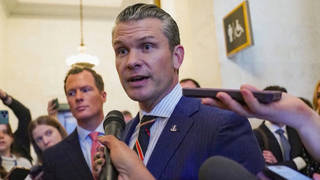
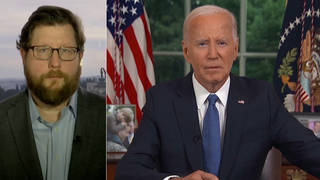
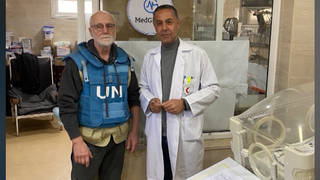
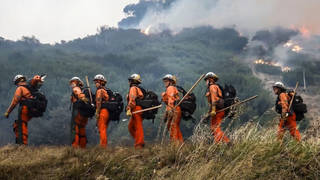





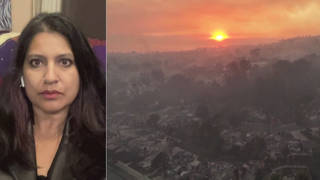
Media Options